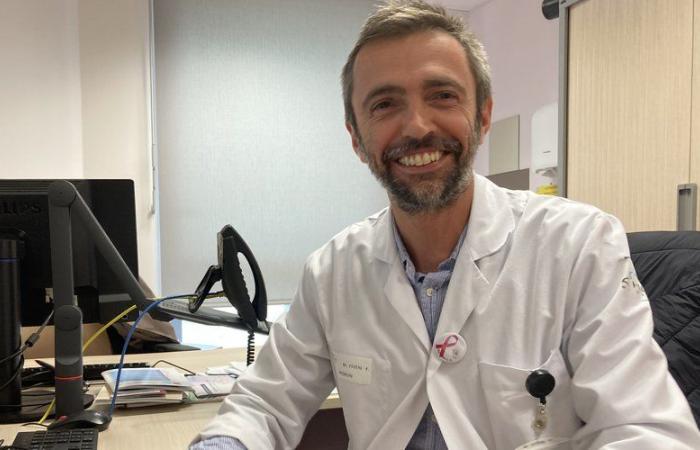
Every Tuesday, for Pink October, Midi Libre explains the care pathway for breast cancer patients. An immersion into the heart of ICG which, after screening, continues with medical oncologist Frédéric Fiténi.
What is the care pathway for a woman who discovers a tumor in her breast?
Either she feels a lump upon palpation, or this lump is discovered during mammography screening. The biopsy will then determine whether it is cancer or not. If it is cancer, the next step will be a CT scan or a Pet-scan to check for metastases and decide on treatment. Patients always worry about what grade their cancer is. For us, there are two stages: either the cancer is localized in the breast, or there are metastases to the liver, lungs, bones or elsewhere…
Localized or metastatic, is this what will determine the treatment?
You have to refine it. Then there is the molecular subtype that we see in the biopsy. There are three: either the cancer is sensitive to hormones, or it is sensitive to HER2, a molecule on the surface of cancer cells, or it is a triple negative. It is the stage and subtype that will determine the treatment.
What is the most common cancer?
About 70% of cancers are hormone-sensitive, and the other two – HER2 and triple negative – account for 15% to 20% of cases each. The average age of patients is 62 years. In 90% of cases of localized cancer, there is no recurrence and this is thanks to screening which makes it possible to identify tumors very early. Metastatic triple negative has the worst prognosis with a median survival of 2 years.
How is localized cancer treated?
When it is localized, there will be surgery and very often radiotherapy to prevent cancer cells from returning to the breast. In addition, depending on the type of cancer, there are drug treatments: chemotherapy, targeted therapy (which targets an abnormality in cancer cells), immunotherapy and hormonal therapy (which blocks hormones).
The goal of these treatments is to kill potential cancer cells (micro-metastases) in the blood for localized cancers that could become metastases later. Chemotherapy kills an invisible enemy and prevents recurrences.
And when there are metastases?
In general, the operation is not of much use. There, we start with a combination of drug treatments that we have just mentioned, adapted to the molecular subtype. We are talking about a chronic illness in which treatments are continued over the long term, such as for diabetes or heart failure.
Some women who have triple negative cancers go to Germany for experimental treatments…
We have everything in France, we have no reason to go to Germany, it’s charlatanism which plays on despair. We have the entire therapeutic arsenal here, we have access to all the treatments, the latest innovations, the most expensive that no one could afford, and we are lucky to be 100% supported. It’s magnificent.
You say “chemotherapy is a bomb that kills cancer cells”. But with collateral damage, side effects?
All drug treatments (chemotherapy, targeted therapy, immunotherapy, hormonal therapy) have their side effects. As soon as we ingest something, there is a risk, even paracetamol… But we do everything we can to avoid them and provide good support to patients.
We know that there are long-term side effects, such as residual fatigue or joint pain with hormone therapy. There is enormous development in oncological supportive care to limit the after-effects of treatments. They are a real pillar of care.
Where is breast cancer research?
Research is evolving very, very quickly. We ensure that patients have access to clinical trials at the Nîmes University Hospital, this is a major benefit for them. They have access to innovative treatments knowing that clinical research never causes patients to lose any benefit, it is always an advantage. For example, we are undergoing trials on a new generation of hormone therapy, which is better tolerated and more effective.





